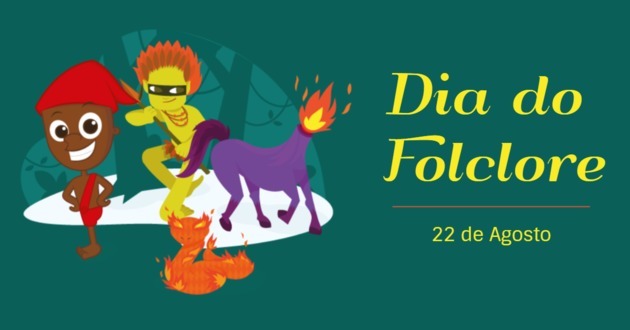O Folklore DayBrazilian is celebrated in August 22. The date was created in order to raise awareness of the importance and appreciation of folkloric manifestations in the country.
August 22 refers to the first time the word folklore was used to refer to the customs of a people. This was in 1846, when British folklorist William John Thoms (1803-1885) put the words together. folk, which means "people", and lore, which means "knowledge".
The date was established in Brazil in 1965 through Decree No. 56.747, of August 17, 1965.

Activities for Folklore Day
Many activities are held on Folklore Day, especially in early childhood education. Check out below some ideas that can be carried out on this date:
- Telling legends;
- Singing folk songs;
- Presenting folk dances;
- Draw and paint folklore characters;
- Produce panels and murals depicting the commemoration;
- Presenting theatrical pieces alluding to folklore;
- Recite proverbs and popular sayings.
To help with the activities, read also:
- Brazilian folklore legends
- folk games
- Popular parties
- folk dances
- riddles
- proverbs and sayings
- Lock languages
Folklore Quiz
Brazilian folklore
Folklore is the set of knowledge of a people, such as the customs, beliefs, speeches, tales, myths, legends, riddles, songs, dances and popular festivals of a culture and region. Brazilian folklore is the result of the union of indigenous, African and European cultures.
In Brazil, the main folklorists and scholars on the subject are Renato Almeida (1895-1981), Mário de Andrade (1893-1945) and Luís da Câmara Cascudo (1898-1986).
It was these folklorists who, in the 20th century, expanded the concept of folklore and popular culture in Brazil. They emphasized the areas of ethnography, ethnology and cultural anthropology, to the detriment of the European vision.
In 1951, a document called the Brazilian Folklore Charter was approved at the I Brazilian Folklore Congress, held in Rio de Janeiro, in August of that year.
Among other things, the Folklore Letter marked the "folklore fact", a concept elaborated by the folklorists of the time:
"Folkloric fact is the way of thinking, feeling and acting of a people, preserved by popular tradition and imitation, and which is not directly influenced by scholarly circles and institutions that are dedicated, or to the renewal and conservation of human scientific heritage, or to the establishment of a religious and philosophical”.
In 1995, at the VIII Brazilian Congress of Folklore, held in the city of Salvador, scholars on the subject reformulated the concept of folklore:
“Folklore is the set of cultural creations of a community, based on its traditions expressed individually or collectively, representative of its social identity. The identification factors of the folkloric manifestation are: collective acceptance, traditionality, dynamism, functionality.”
Read too: what is folklore


